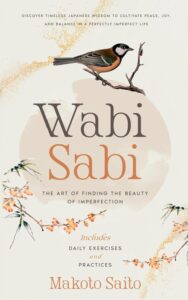In our relentless pursuit of perfection, we often overlook the profound wisdom found in accepting things as they are—imperfect, impermanent, and incomplete. This ancient Japanese philosophy of wabi-sabi not only offers aesthetic principles but may also hold remarkable benefits for our physical, mental, and emotional well-being.

What is Wabi-Sabi?
Wabi-sabi represents a worldview centered on accepting transience and imperfection. The aesthetic is sometimes described as one of appreciating beauty that is “imperfect, impermanent, and incomplete.” Originating in Buddhist teaching, wabi-sabi embraces the flawed or aged, particularly the modest, humble, unpretentious, and earthly.
Mental Health Benefits
Reduced Anxiety and Stress
One of the most significant health benefits of embracing wabi-sabi is reduced anxiety. In a world where social media constantly bombards us with carefully curated images of “perfect” lives, the pressure to achieve flawlessness can be overwhelming. Wabi-sabi encourages us to release this pressure valve.
Studies have shown that perfectionism is strongly linked to anxiety disorders, depression, and even eating disorders. By embracing wabi-sabi, we give ourselves permission to appreciate the beauty in imperfection, significantly reducing the cortisol levels associated with chronic stress.
Enhanced Self-Acceptance
When we apply wabi-sabi principles to ourselves, we begin to appreciate our own unique characteristics, including our flaws. This self-acceptance is crucial for mental health, as it fosters genuine self-esteem rather than the conditional self-worth that comes from external validation.
Research from positive psychology indicates that self-acceptance is one of the strongest predictors of psychological well-being. People who accept themselves experience lower rates of depression and greater life satisfaction.
Mindfulness and Present-Moment Awareness
Wabi-sabi encourages us to notice the small details that might otherwise go unappreciated: the patina on an old wooden table, the irregular pattern of handmade pottery, or the subtle changes in leaves as seasons transition. This attention to detail naturally cultivates mindfulness.
Mindfulness practices have been extensively studied and shown to reduce rumination (repetitive negative thinking), decrease emotional reactivity, and improve focus. Regular mindfulness practice can even change brain structures associated with awareness, introspection, and compassion.
Physical Health Benefits
Lower Blood Pressure
The stress reduction that comes with wabi-sabi’s acceptance philosophy can have measurable effects on cardiovascular health. Studies have consistently linked chronic stress to hypertension, and mind-body interventions that promote acceptance have been shown to help lower blood pressure.
Improved Immune Function
Chronic stress suppresses immune function by releasing cortisol, which inhibits the body’s inflammatory response and reduces the number of lymphocytes available to fight infection. By reducing perfectionism-related stress, wabi-sabi philosophy may indirectly support healthier immune function.
Better Sleep Quality
The mental calm that comes from embracing imperfection can significantly improve sleep quality. Rumination and anxiety frequently disrupt sleep patterns, and the acceptance inherent in wabi-sabi philosophy can help quiet the mind before bedtime.
Quality sleep is foundational to virtually every aspect of health, affecting everything from cognitive function to metabolic processes and emotional regulation.
Social Health Benefits
More Authentic Relationships
When we embrace the imperfect nature of ourselves and others, our relationships tend to become more authentic and compassionate. Instead of maintaining a façade of perfection or expecting it from others, wabi-sabi allows us to connect more genuinely.
Research in social psychology confirms that authentic relationships—where people feel accepted despite their flaws—contribute significantly to overall well-being and longevity.
Reduced Social Comparison
Social comparison is a significant source of unhappiness in modern life. Wabi-sabi philosophy discourages comparison by emphasizing uniqueness and individual journeys. By appreciating the unique “cracks” in our own lives, we’re less likely to covet what others have.
Greater Community Connection
Wabi-sabi extends beyond personal philosophy to shape community values. Communities that embrace diversity, imperfection, and the natural aging process tend to be more inclusive and supportive. This sense of belonging is a powerful determinant of health outcomes, with some research suggesting that social connection is as important to longevity as not smoking.
Practical Applications of Wabi-Sabi
Home Environment
Creating a wabi-sabi inspired living space can contribute to reduced stress levels. This might include:
- Natural materials that age beautifully, like wood and stone
- Handmade items with visible evidence of their creation
- Plants at different stages of growth and bloom
- Limited clutter, focusing on items with meaning rather than perfection
- Spaces that evolve naturally rather than adhering to rigid design rules
Research on environmental psychology confirms that our surroundings significantly impact our mental state. Spaces that feel authentic and connected to nature typically reduce stress markers and improve mood.
Dietary Approach
Wabi-sabi can transform our relationship with food by:
- Appreciating seasonal, locally grown produce with natural variations
- Finding beauty in simple, minimally processed meals
- Being present and mindful during eating
- Accepting natural hunger and fullness cues rather than adhering to strict rules
- Celebrating traditional preparation methods that connect us to cultural heritage
This approach stands in stark contrast to the perfectionism often seen in diet culture, which can lead to disordered eating patterns and an unhealthy relationship with food.
Movement and Exercise
A wabi-sabi approach to physical activity might include:
- Enjoying movement for its own sake rather than pursuing perfect form or results
- Appreciating what our bodies can do today, acknowledging fluctuations in ability
- Finding joy in natural, functional movement rather than choreographed perfection
- Recognizing progress as nonlinear, with natural ebbs and flows
This perspective can transform exercise from a chore or punishment into a celebration of being alive in an imperfect, changing body.
The Science Behind Wabi-Sabi's Health Benefits
The health benefits of wabi-sabi aren’t merely philosophical—they’re increasingly supported by scientific research. Recent studies in psychoneuroimmunology reveal the complex connections between our thoughts, emotions, and physical health.
When we embrace imperfection and release the need for control, we activate the parasympathetic nervous system (our “rest and digest” state) rather than the sympathetic nervous system (our “fight or flight” response). This shift has cascading effects throughout the body:
- Decreased inflammation markers
- Improved heart rate variability
- Enhanced digestion and nutrient absorption
- Better hormonal balance
- More efficient immune response
Neuroplasticity research further suggests that consistent practice of acceptance-based mindsets can actually reshape neural pathways, making calm acceptance our default response rather than anxious striving.
Conclusion
In a healthcare system often focused on treating symptoms rather than addressing root causes, wabi-sabi offers a complementary approach—a form of preventive medicine for the mind and body. By releasing perfectionism, embracing natural cycles, and finding beauty in impermanence, we create internal conditions conducive to holistic health.
The next time you notice a wrinkle, a scar, or a crack in a beloved possession, consider viewing it through the lens of wabi-sabi. That imperfection isn’t just something to tolerate—it might be the very thing that makes life meaningful, authentic, and ultimately, healthier.
In embracing wabi-sabi, we don’t just find a philosophy for living—we discover a pathway to genuine well-being that has sustained human flourishing for centuries.
Hey there! We hope you love our fitness programs and the products we recommend. Just so you know, Symku Blog is reader-supported. When you buy through links on our site, we may earn an affiliate commission at no extra cost to you. It helps us keep the lights on. Thanks.
Disclaimer: The information provided in this discussion is for general informational and educational purposes only. It is not intended as medical or professional advice. Only a qualified health professional can determine what practices are suitable for your individual needs and abilities.


